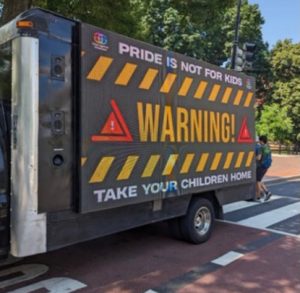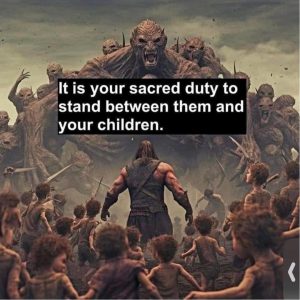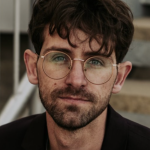A rhetoric of “protecting the children” has been gaining momentum over the last two years, and it’s targeting the LGBTQ community.
On June 9, the hashtag “LeaveOurKidsAlone” was used on Twitter to celebrate young kids trampling Pride flags. The hashtag is connected to a 133,000+ Facebook community.

Gays Against Groomers drove this truck around the D.C. Pride parade.
On June 10, “Gays Against Groomers,” an LGBTQ hate group, parked a truck at D.C. Pride, demanding parents take their kids home.
As of June 13, the hashtag “LeaveOurKidsAlone” had been used 8,291 times on Instagram. While there are posts about vaccinations and pedophiles, the vast majority are devoted to attacking Pride and LGBTQ people, all with imagery that presents queer people and the government as an evil that must be stopped at all costs.
The emotional effect is jarring, making those who are posting appear like valiant warriors fighting against an atrocious evil.
Problem: The atrocious evil presented in these images is queer people simply trying to live their lives in peace. Instead, they’re paying a horrific price.
According to the ACLU, 491 anti-LGBTQ laws went up for a vote in 2023, the vast majority proposed on the basis of protecting children, and on June 6, the Human Rights Campaign issued a state of emergency for LGBTQ people due to 75 of these bills being signed into law.
But this isn’t new.

Anti-LGBTQ meme
In fact, the phrase “Save the Children,” a predecessor to “leave our children alone,” was invoked in 1977 by Anita Bryant, who successfully leveraged the phrase to pass anti-LGBTQ legislation, legislation that empowered Florida schools to discriminate against LGBTQ teachers, claiming they are sexually deviant and therefore more likely to offend on children.
If this rhetoric has been used for decades, successfully passing in many states, maybe it’s true. Maybe we should fear queer people. Maybe they are a threat to children.
What do the data say?
A few decades after Bryant successfully convinced the state of Florida to protect schools who fired LGBTQ teachers, Carole Jenny and her colleagues reviewed 352 medical charts of victims of sexual abuse. Of the 352 cases, only two perpetrators were gay or lesbian. That’s less than 1%.
Beyond that, numerous studies have been conducted on pedophilia, and the results show perpetrators are attracted to age, not gender. It’s a separate sexuality altogether.

Anti-LGBTQ meme
But in hopes to villainize queer people, LGBTQ individuals have been lumped in with child abusers, and to question this conflation is punished with silencing rhetoric: OK groomer! Sicko! Don’t you want kids safe? Do you support pedophilia?”
Yes, we want kids safe. No, we don’t support pedophilia.
So why are we talking about drag queens and not pastors?
The recent FX and Vanity Fair documentary Secrets of Hillsong revealed that megachurch pastor Brian Houston’s father sexually assaulted children for years. And then in 2022, an independent investigation by Guidepost Solutions resulted in a 288-page document of sexual assault cases in the Southern Baptist Convention.
Religious leaders offending on minors is a narrative far more common than queer people abusing kids at the local library drag story time.
To vividly portray this, attorney Kristen Prata Browde of Browde Law has been posting TikToks weekly of pedophile arrests. Week after week, there are stories of straight men and pastors abusing children. However, there has yet to be a drag queen.
In contrast, 93% of sex offenders identify as religious and 10% of Protestant ministers are reported to have committed sexual misconduct.
There is a plethora of information supporting the claim that churches are far less safe than Pride events. But where’s the outrage against ministers on social media? Where’s the legislation barring kids from attending church?
Don’t you want kids safe? Do you support pedophilia?
At the end of the day, this rhetoric has nothing to do with the welfare of children. It has everything to do with queerphobia, and the LGBTQ community is paying the bill.

Brandon Flanery
Brandon Flanery is a signed writer with Lake Drive Books and his debut book, Stumbling: A Sassy Memoir about Coming Out of Evangelicalism, releases August 2023. Flanery researches and writes about the intersection of faith and sexuality and has been featured in the Colorado Springs Indy and the University of Colorado’s The Scribe. To read more of his work or get book updates, go to BrandonFlanery.com or follow him on Instagram.


